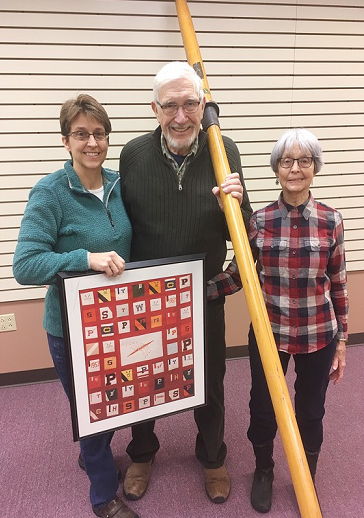The Post-Journal
by Scott Kindberg
October 13, 2020
Gravink Made Quite A Name For Himself In Rowing And Skiing
EDITOR’S NOTE: The following article appeared in The Post-Journal in 2006 when Clymer native and Chautauqua Sports Hall of Fame inductee Phil Gravink spoke at a luncheon at the Chautauqua Lake Yacht Club. Gravink died last week at 84. Given his contributions to the ski industry — and Peek’n Peak in particular — and his passion for and success in rowing, it was deemed appropriate to run the story again.

LAKEWOOD — Phil Gravink grew up in Clymer, graduated from high school there in 1953 and headed to Cornell University where he planned to play football. His gridiron career lasted less than two weeks.
“Even though we had a championship six-man Class C football team in Clymer, that didn’t count for much,” Gravink said. “When I got (to Cornell) there were about 100 other candidates.”
With the handwriting on the wall, he decided to take the recommendation of the crew coach, R. Harrison Sanford, and pay a visit to the boat house.
“In the freshman registration, (Sanford) stood in the line where every freshman had to walk by and looked everybody up and down,” Gravink said. “If you sort of fit the physique of an oarsman, you got an invitation to try rowing.
“That’s where the good luck started.”
It’s lasted a half century.
Although he’d never rowed before, Gravink, now 70, became part of a crew that put together one of the finest eras in the history of the sport.
In four years, the nine crew members posted a 108-5 record, won three varsity national championships, came ever so close to representing the United States in the 1956 Olympics in Melbourne, Australia, and won the Royal Henley Regatta in 1957 on the river Thames.
“Rowing probably gave me confidence and the understanding of teamwork,” said Gravink, who was the luncheon speaker Friday at the Chautauqua Lake Yacht Club.
His resume would appear to support that philosophy. Gravink, who was a guest of the Chautauqua Lake Rowing Club, now lives in Jackson, New Hampshire with his wife Shirley. He retired in 2000 after 36 years of managing ski resorts, including Peek’n Peak, which he helped found. He was also the owner/advisor for the family dairy farm in Clymer for nearly 30 years and successfully completed Odyssey 2000, a 48-country, around-the-world bicycle tour.
But he admits none of that may have happened were it not for his four years at Cornell where he is a charter member of the school’s athletics Hall of Fame.
“I grew up with nine people and, basically, we stayed together for the next four years,” he said.
And next month will mark 50 years since Gravink and his teammates experienced a “life-changing” event.
“We won the nationals in Syracuse and two weeks later we entered the Olympic Trials for the right to represent the United States in Melbourne that fall,” Gravink said. “We were heavily favored. Well, Yale upset us by a little over a second. They went to Melbourne and won a gold medal and we went home.”
The next year, 1957, was Gravink’s senior year. Cornell beat Yale three times, including in the Royal Henley Regatta where the Big Red also beat the Russians and broke a 130-year-old record to boot.
“The best thing that ever happened to us is when Yale beat us (in 1956),” Gravink said. “I learn more about losing than winning all the time. That’s part of any good sport, I think. Rowing is absolutely the ultimate team sport.”
Gravink hopes that area residents — thanks to the efforts of the newly formed Chautauqua Lake Rowing Association — will take to crew just as he did more than 50 years ago.
“My story might have been a little different had there been a group of innovative, ambitious visionaries like there are in this room … but unfortunately that didn’t happen,” Gravink said.
After his successes at Cornell, he returned to his Clymer farm. In 1959, Gravink received a phone call from the West Side Rowing Club in Buffalo.
“They were putting together a meet to compete to enter the Olympic Trials in 1960 for the right to represent the country in Rome,” he said. “But with two babies and 60 cows, that kind of ruled out the idea of (me) commuting to Buffalo to row four or five nights a week. Had there been a rowing club on Chautauqua, it could have been a different story.”
Ironically, by 1968 or 1972, Gravink said, the West Side Rowing Club did have a crew make the United States Olympic team.
“This might all sound beyond your dreams and imaginations right now, but once you get the rowing facility the sport grows itself,” he said.
“Who knows? Fifteen or 20 years from now the legacy you’re developing about this club may not be dissimilar to the West Side Rowing Club.”
At his camp in Maine, Gravink has a poster on the wall depicting a birds-eye view of a lake. On it is a boat, which is propelled by a crew team.
“The boat is perfectly synchronized on very smooth water,” he said. “The caption on the picture I read every time (I pass by). It says, ‘Eight hearts beat as one.’
“That’s rowing.”
The additional financial assistance of the community is critical to the success of the Chautauqua Sports Hall of Fame.
We gratefully acknowledge these individuals and organizations for their generous support.











